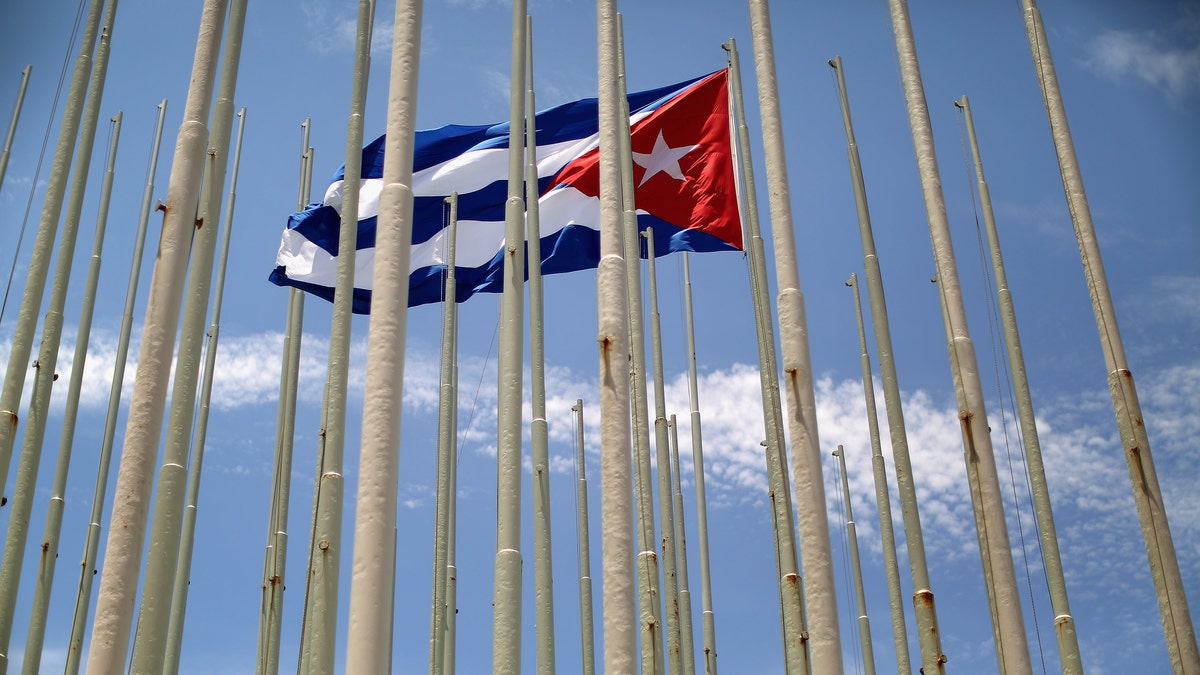
HAVANA, CUBA - AUGUST 13: A lone Cuban flag is raised inside the 'Wall of Flags' across the street from the U.S. Embassy August 13, 2015 in Havana, Cuba. Cuba planted 138 flag poles in February 2006 in an attempt to obsucre an electronic message ticker on the outside of the U.S. Interests Section building. U.S. Secretary of State John Kerry will visit Havana Friday and raise the American flag at the reopened U.S. embassy, a symbolic act after the the two former Cold War enemies reestablished diplomatic relations in July. (Photo by Chip Somodevilla/Getty Images) (2015 Getty Images)
Thousands of Cubans are stranded at the border between Costa Rica and Nicaragua, almost exactly one year after President Obama fulfilled a long-held liberal wish: the normalization of relations with Cuba.
The idea behind normalization, of course, was that replacing coldness and embargo with positive exchanges between the two countries would result in improved conditions for the Cuban people. Now, the presence of upwards of 8,000 aspiring migrants in Costa Rica is a sign that hope for progress on the island has been frustrated.
The worst possible outcome is one where the fear of the those rushing for the exits is justified, and the Obama administration does the bidding of the Castro regime once again, closing the door through which so many have left Cuba to reach the land where dreams come true.
There has actually been a sharp spike in migration to the U.S. since the thaw, both with visas to third countries like Ecuador, and with dangerous attempts to cross the straits in rickety boats. This is due to frustration with the lack of progress but also to fear that the Obama administration will cave to recent demands from Cuba to change the decades-long immigration policy that grants residency to Cubans that reach the United States.
Those who vociferously opposed the administration’s overtures and concessions, citing concerns that easing travel restrictions would only boost revenues for the Cuban government, were told that the thaw would also bring a breath of freedom to the suffocating people. Comfortable interactions with American tourists, investment opportunities and the elevation of the country in international opinion from pariah to flawed-but-friendly neighbor would translate into a concrete improvement in human rights for the island’s people.
However, far from enjoying new freedoms, a year into the thaw Cubans continue to labor under miserable conditions imposed from above. Empty government-store shelves, salaries with tragically low caps, the lowest internet access in the world, crowded and crumbling housing, universal but woefully inadequate healthcare — these are just a few of the things that haven’t changed.
The beautiful European-owned resorts (now filling with American tourists) continue to pay the government proper living wages for their Cuban employees, most of which money the government pockets. The employees receive a miserable slave-wage for their labor, and try to subsist on tips. Abuse and oppression of political dissidents and critics of the government has accelerated sharply this year, with the Havana-based Cuban Commission on Human rights reporting 7,686 political arrests through November. Dozens of dissidents, including several Ladies in White, were arrested on December 10: Human Rights Day.
Cubans are voting with their feet and Miami is full of the newly arrived. They are waitressing in seemingly every restaurant, driving every Uber, and clerking behind every counter. They are young, pleasant, hard working and enthusiastic. Their smiles are infectious and their accents slow and drawling. The thousands stuck in Central America will do anything to join their ranks.
Cuban officials have stepped up pressure on the Obama administration to close the special loophole that grants residency almost automatically to any Cuban who can reach our shores — the so-called “dry-foot” law. Cuba argues that this policy encourages dangerous migration attempts. It is more likely that the Cuban government would simply like the U.S. to stop acting like Cuba is the kind of place that people want to escape from. The dry-foot law is a clear acknowledgement of the awful fact that just 90 miles from our shores, in our very own hemisphere, is one of the most repressive and unjust societies in the world.
Cuba also complains about the brain drain that this policy causes. Many of the thousands leaving the island for the U.S. are professionals, some of them taking advantage of a special 2006 program that offers American residency to medical workers from the island who are posted overseas. Cuba rents out the services of tens of thousands of nurses, dentists and doctors in exchange for millions of dollars worth of oil and cash. The professionals receive a bare stipend and live in squalid conditions, working at what Cuba calls “medical diplomacy” but what could more properly be called indentured servitude.
On Monday, Central American nations announced a deal that would allow the thousands of Cubans stranded in Costa Rica to continue to make their way north to the United States. On Sunday Pope Francis himself called for a quick resolution to the developing humanitarian crisis.
This is excellent news for the migrants trapped in Costa Rica. Better news would be a real improvement of conditions on the island, so that those that dream of a better future could start to imagine one at home. The worst possible outcome is one where the fear of the those rushing for the exits is justified, and the Obama administration does the bidding of the Castro regime once again, closing the door through which so many have left Cuba to reach the land where dreams come true.
